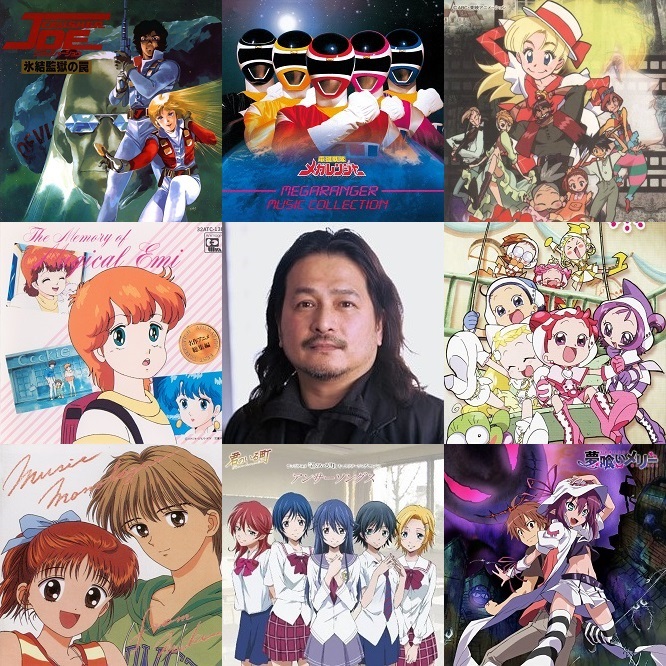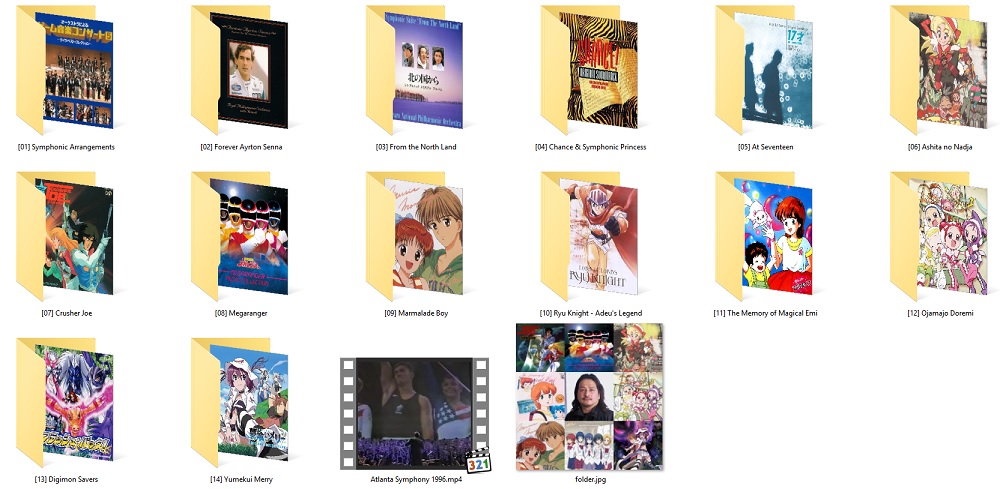Vinphonic
06-14-2018, 10:24 PM
The Legacy of Japanese Composer
Keiichi Oku
A nextday/Vinphonic Co-Production

Overture (http://picosong.com/wcTya/) / Main Theme (http://picosong.com/wcTyW/) / Resolution (http://picosong.com/wcTq3/)
A few words by Vinphonic:
Keiichi Oku is a Japanese keyboardist, composer, orchestrator, arranger, performer and college professor. He was the keyboardist in the Japanese band Spectrum from 1979-1981 until he worked as a media composer, and is currently a professor at Senzoku Gakuen College of music.
Another brilliant composer with a flawless sense of melody that should have gotten a lot more work and budget as his genius deserves. He has one of my absolute favorite anime scores of all time under his belt, Ashita no Nadja.
From the very first note your instantly in his world. (http://picosong.com/wcNtJ/)
It was so good Oku gave up writing orchestral symphonic music for anime after a few other attempts because he understood he just can't top it. A Violin concert piece for Yumekoi Merry was his last great contribution to the medium and his farewell until now was "A Town where you live" in 2013, which was straight out of the days he started as a composer to come full circle. Nadja was so good it even won an award in 2009, the JASRAC International Award for background music. The score for Nadja uses a lot of classical pieces or pieces written in a certian classical style but what makes it genius is that amidst all the masterful compositions Oku rearranged and interpreted, his own score doesn't fall behind at all but instead stands head and shoulders proud alongside them. If someone who is not familiar with the concert world was told the pieces found in Nadja are originals he would not raise an eyebrow. Rarely have concert pieces sounded so convincing as studio recordings. I consider this Oku's Magnum Opus and he wrote it as his last mayor orchestral score, a crowning achievement after 20 years in the business, after which he focused on the academic field and being a teacher. The original material is there in abundance, from Waltz No. 5 to Resolution, together with vibrant and brilliant orchestral (Leitmotif) writing and a delightful playfulness and romance, make this an unforgetable magical journey.
Oku isn't as virtuosic, glissfull, romantic and full of Bravado as Asakawa, but more like an elegant, methodical, and refined older brother. What Nadja demonstrates transfers to all his TV work, a magic touch of melodic gift with Golden Age scoring approach: Overtures and long End Titles. In general Oku's orchestral work is full of catchy and/or great themes and melodies and all packed in exhubertant orchestral clothing. He was also quite prolific as an arranger and excelled at that task too, delivering some of my favorite pieces for the Orchestral Game concert series, an excellent heroic concert suite for Arc The Lad, a brassy concert work for a T-Square album, a powerful and energetic symphonic memorial for Ayrton Senna with a bit of his band persona shining through and many symphonic arrangements of bouncy pop pieces that are concert grade par excellence. He even wrote a piece for the 1996 Olympic Games in Atlanta that was performed live on stage. His scores are full of classical gravitas, from Golden Age Overture to Violin Concerto. In Lord of Lords Ryu Knight and Ojamajo Doremi shines his band persona through the strongest with that special Sax touch of his, warm, peaceful and catchy:
Izumi the Priest (http://picosong.com/wcNDp)
On that note my absolute favorite composers alive right now and working were/are also/originally band players jamming it to a catchy tune (Williams/Kanno/Tanaka/Sahashi/Iwasaki/Yamashita/Matsuo/Oku/Hattori/Oshima/Hisaishi/Amano/etc.).
There's another side to Oku that is on the other hand just plain weird, even weirder than Isao Tomita. Oku's classical interpretation albums dedicated to Mozart, Beethoven and others are strange electronic/Keyboard works that I find difficult to enjoy. Some of his early Band works in his TV scores is also not to my taste and pretty much a product of its time and nothing more. That said, in Doremi I just can't skip it. He very much refined it at that point in the early 2000s and its bouncy nature is much to my liking, similar to Takaki's Precure.
In my opinion, the one who could inherit Oku's musical approach, should he not return to the scoring stage again, is undoubtly Hiroshi Takaki, who hopefully will be getting the chance to work on a symphony orchestra again. He has a few more years to grow before he reaches Oku in his best condition, afterall he wrote Nadja after being over 20 years in the business as his crowning achievement but with Mahou Tsukai Takaki already achieved a level of orchestral writing that is comparable to Oku's early works in quality.

DOWNLOAD (https://mega.nz/#!auY3nADJ!NrWl45UNbINbc1mE6k2Cdg6iABydHwvhr26J0zQUUnE)
This orchestral collection is a collaboration between nextday and myself and orginally started as a request by nextday. Herr Salat provided Ayton Senna and Crusher Joe, nextday provided From the Northland, At 17, the Symphonic Pop albums and the Atlanta piece. Symphonic Arrangements and Marmalade Boy are my CD-rips and the latter has not been shared previously in FLAC around this place. Megaranger, Yumekoi Merry, Emi, Doremi, Digimon and Nadja are from the web. I should note I've also remastered Nadja to give it a more classical character. I would have loved to share Nadja in FLAC too but OST 2 is perhaps the rarest anime soundtrack I know, from 200$ upwards and my most hunted trasure.
https://vgmdb.net/album/73970
If anyone has it, let me know!
I've also edited most soundtracks a lot so that all orchestral pieces are now separate from the band/nonorchestral stuff.
Keiichi Oku
A nextday/Vinphonic Co-Production

Overture (http://picosong.com/wcTya/) / Main Theme (http://picosong.com/wcTyW/) / Resolution (http://picosong.com/wcTq3/)
A few words by Vinphonic:
Keiichi Oku is a Japanese keyboardist, composer, orchestrator, arranger, performer and college professor. He was the keyboardist in the Japanese band Spectrum from 1979-1981 until he worked as a media composer, and is currently a professor at Senzoku Gakuen College of music.
Another brilliant composer with a flawless sense of melody that should have gotten a lot more work and budget as his genius deserves. He has one of my absolute favorite anime scores of all time under his belt, Ashita no Nadja.
From the very first note your instantly in his world. (http://picosong.com/wcNtJ/)
It was so good Oku gave up writing orchestral symphonic music for anime after a few other attempts because he understood he just can't top it. A Violin concert piece for Yumekoi Merry was his last great contribution to the medium and his farewell until now was "A Town where you live" in 2013, which was straight out of the days he started as a composer to come full circle. Nadja was so good it even won an award in 2009, the JASRAC International Award for background music. The score for Nadja uses a lot of classical pieces or pieces written in a certian classical style but what makes it genius is that amidst all the masterful compositions Oku rearranged and interpreted, his own score doesn't fall behind at all but instead stands head and shoulders proud alongside them. If someone who is not familiar with the concert world was told the pieces found in Nadja are originals he would not raise an eyebrow. Rarely have concert pieces sounded so convincing as studio recordings. I consider this Oku's Magnum Opus and he wrote it as his last mayor orchestral score, a crowning achievement after 20 years in the business, after which he focused on the academic field and being a teacher. The original material is there in abundance, from Waltz No. 5 to Resolution, together with vibrant and brilliant orchestral (Leitmotif) writing and a delightful playfulness and romance, make this an unforgetable magical journey.
Oku isn't as virtuosic, glissfull, romantic and full of Bravado as Asakawa, but more like an elegant, methodical, and refined older brother. What Nadja demonstrates transfers to all his TV work, a magic touch of melodic gift with Golden Age scoring approach: Overtures and long End Titles. In general Oku's orchestral work is full of catchy and/or great themes and melodies and all packed in exhubertant orchestral clothing. He was also quite prolific as an arranger and excelled at that task too, delivering some of my favorite pieces for the Orchestral Game concert series, an excellent heroic concert suite for Arc The Lad, a brassy concert work for a T-Square album, a powerful and energetic symphonic memorial for Ayrton Senna with a bit of his band persona shining through and many symphonic arrangements of bouncy pop pieces that are concert grade par excellence. He even wrote a piece for the 1996 Olympic Games in Atlanta that was performed live on stage. His scores are full of classical gravitas, from Golden Age Overture to Violin Concerto. In Lord of Lords Ryu Knight and Ojamajo Doremi shines his band persona through the strongest with that special Sax touch of his, warm, peaceful and catchy:
Izumi the Priest (http://picosong.com/wcNDp)
On that note my absolute favorite composers alive right now and working were/are also/originally band players jamming it to a catchy tune (Williams/Kanno/Tanaka/Sahashi/Iwasaki/Yamashita/Matsuo/Oku/Hattori/Oshima/Hisaishi/Amano/etc.).
There's another side to Oku that is on the other hand just plain weird, even weirder than Isao Tomita. Oku's classical interpretation albums dedicated to Mozart, Beethoven and others are strange electronic/Keyboard works that I find difficult to enjoy. Some of his early Band works in his TV scores is also not to my taste and pretty much a product of its time and nothing more. That said, in Doremi I just can't skip it. He very much refined it at that point in the early 2000s and its bouncy nature is much to my liking, similar to Takaki's Precure.
In my opinion, the one who could inherit Oku's musical approach, should he not return to the scoring stage again, is undoubtly Hiroshi Takaki, who hopefully will be getting the chance to work on a symphony orchestra again. He has a few more years to grow before he reaches Oku in his best condition, afterall he wrote Nadja after being over 20 years in the business as his crowning achievement but with Mahou Tsukai Takaki already achieved a level of orchestral writing that is comparable to Oku's early works in quality.

DOWNLOAD (https://mega.nz/#!auY3nADJ!NrWl45UNbINbc1mE6k2Cdg6iABydHwvhr26J0zQUUnE)
This orchestral collection is a collaboration between nextday and myself and orginally started as a request by nextday. Herr Salat provided Ayton Senna and Crusher Joe, nextday provided From the Northland, At 17, the Symphonic Pop albums and the Atlanta piece. Symphonic Arrangements and Marmalade Boy are my CD-rips and the latter has not been shared previously in FLAC around this place. Megaranger, Yumekoi Merry, Emi, Doremi, Digimon and Nadja are from the web. I should note I've also remastered Nadja to give it a more classical character. I would have loved to share Nadja in FLAC too but OST 2 is perhaps the rarest anime soundtrack I know, from 200$ upwards and my most hunted trasure.
https://vgmdb.net/album/73970
If anyone has it, let me know!
I've also edited most soundtracks a lot so that all orchestral pieces are now separate from the band/nonorchestral stuff.